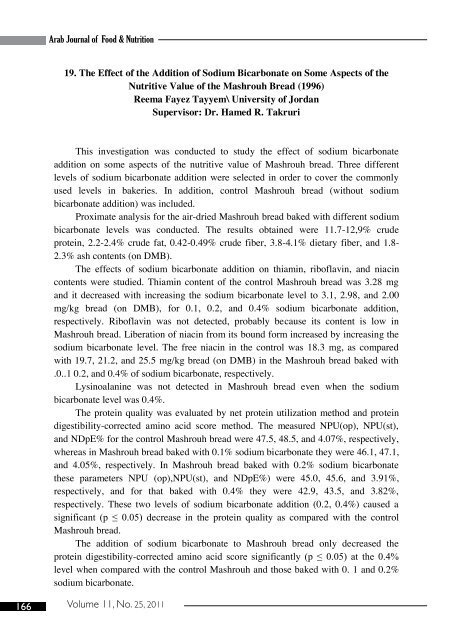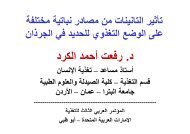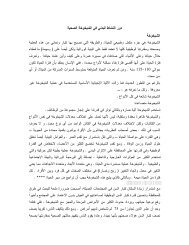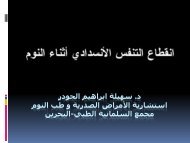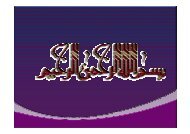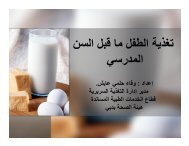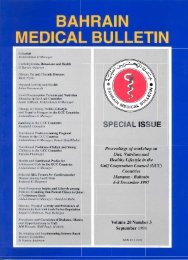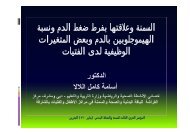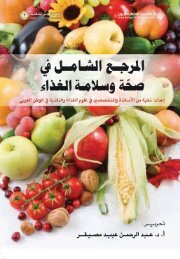Food & Nutrition
Food & Nutrition
Food & Nutrition
You also want an ePaper? Increase the reach of your titles
YUMPU automatically turns print PDFs into web optimized ePapers that Google loves.
Arab Journal of <strong>Food</strong> & <strong>Nutrition</strong><br />
19. The Effect of the Addition of Sodium Bicarbonate on Some Aspects of the<br />
Nutritive Value of the Mashrouh Bread (1996)<br />
Reema Fayez Tayyem\ University of Jordan<br />
Supervisor: Dr. Hamed R. Takruri<br />
This investigation was conducted to study the effect of sodium bicarbonate<br />
addition on some aspects of the nutritive value of Mashrouh bread. Three different<br />
levels of sodium bicarbonate addition were selected in order to cover the commonly<br />
used levels in bakeries. In addition, control Mashrouh bread (without sodium<br />
bicarbonate addition) was included.<br />
Proximate analysis for the air-dried Mashrouh bread baked with different sodium<br />
bicarbonate levels was conducted. The results obtained were 11.7-12,9% crude<br />
protein, 2.2-2.4% crude fat, 0.42-0.49% crude fiber, 3.8-4.1% dietary fiber, and 1.8-<br />
2.3% ash contents (on DMB).<br />
The effects of sodium bicarbonate addition on thiamin, riboflavin, and niacin<br />
contents were studied. Thiamin content of the control Mashrouh bread was 3.28 mg<br />
and it decreased with increasing the sodium bicarbonate level to 3.1, 2.98, and 2.00<br />
mg/kg bread (on DMB), for 0.1, 0.2, and 0.4% sodium bicarbonate addition,<br />
respectively. Riboflavin was not detected, probably because its content is low in<br />
Mashrouh bread. Liberation of niacin from its bound form increased by increasing the<br />
sodium bicarbonate level. The free niacin in the control was 18.3 mg, as compared<br />
with 19.7, 21.2, and 25.5 mg/kg bread (on DMB) in the Mashrouh bread baked with<br />
.0..1 0.2, and 0.4% of sodium bicarbonate, respectively.<br />
Lysinoalanine was not detected in Mashrouh bread even when the sodium<br />
bicarbonate level was 0.4%.<br />
The protein quality was evaluated by net protein utilization method and protein<br />
digestibility-corrected amino acid score method. The measured NPU(op), NPU(st),<br />
and NDpE% for the control Mashrouh bread were 47.5, 48.5, and 4.07%, respectively,<br />
whereas in Mashrouh bread baked with 0.1% sodium bicarbonate they were 46.1, 47.1,<br />
and 4.05%, respectively. In Mashrouh bread baked with 0.2% sodium bicarbonate<br />
these parameters NPU (op),NPU(st), and NDpE%) were 45.0, 45.6, and 3.91%,<br />
respectively, and for that baked with 0.4% they were 42.9, 43.5, and 3.82%,<br />
respectively. These two levels of sodium bicarbonate addition (0.2, 0.4%) caused a<br />
significant (p ≤ 0.05) decrease in the protein quality as compared with the control<br />
Mashrouh bread.<br />
The addition of sodium bicarbonate to Mashrouh bread only decreased the<br />
protein digestibility-corrected amino acid score significantly (p ≤ 0.05) at the 0.4%<br />
level when compared with the control Mashrouh and those baked with 0. 1 and 0.2%<br />
sodium bicarbonate.<br />
166<br />
Volume 165 11, No. 25, 2011


